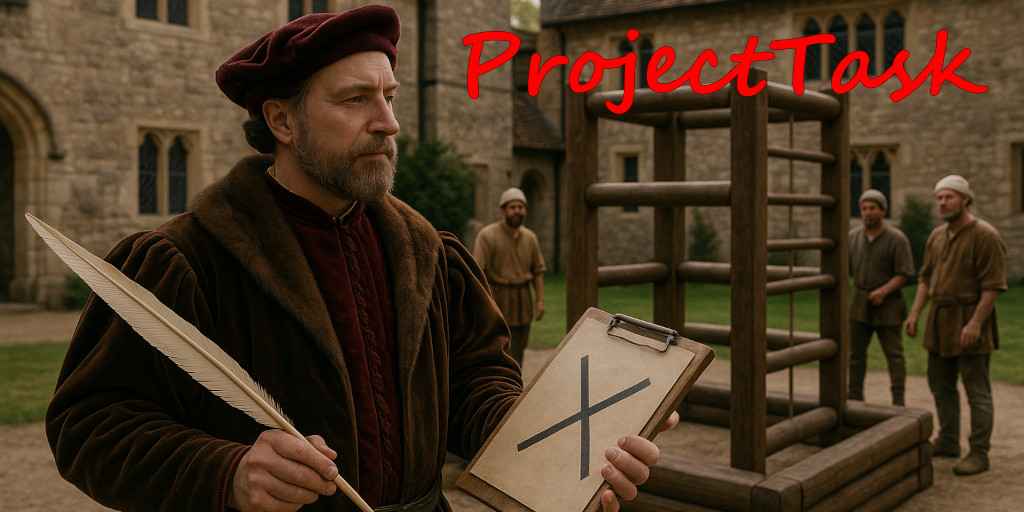Dan's ProjectTask Library

A Flexible .NET Project Management Library
Plan it. Schedule it. Track it. Transform it.
Current Status: In-Testing for version 25.2800.0000.
Introduction
ProjectTask is a powerful, stand-alone .NET Standard 2.0 class library built to support flexible, event-driven project management, across any methodology, whether it's MSF (Microsoft Solutions Framework), XP (Extreme Programming / Extreme Productivity), Agile, SCRUM, Kanban, or good old-fashioned Waterfall.
With full support for JSON serialization, dependency handling, and hierarchical task structures, this library is designed to be embedded into a wide variety of planning and scheduling applications. Whether you're managing a sprawling enterprise program or organizing a weekend hackathon, ProjectTask can adapt to your needs.
... and by the way, tasks and projects are interchangeable, meaning that you can seamlessly convert between them without data loss just by changing the item type.
Features
Following are only some of the features you can find in this library.
- Automatic Task and Project Estimation and Scheduling
Calculate and prepare the timeline of an entire project and its tasks from a single call. - Unified Task and Project Model
Treat projects and tasks as one and the same. Any item can contain children and dependencies, and you can switch types freely. - Event-Driven Property Change Notification
You can register events on objects and their properties to get notified in real time when anything changes, with fine-grained control over object updates. - Full JSON Serialization and Deserialization
Save and load project structures with ease using standard, human-readable JSON format. - Dependency and Hierarchy Handling
Model complex workflows with multiple parents, children, and task dependencies. - Versatile Methodology Support
Designed to flex with your process, whether you're sprinting in Agile or plotting milestones in Waterfall. - Rooted in Legacy and Built for the Future
Born from ANSI-C 5.0 in the early 1990s and evolved through decades of application. This library is robust, refined, and battle-tested.
Some History
Before task management was a buzzword, I was hand-rolling an early predecessor of this library in Microsoft QuickC circa 1990, using structs, pointers, and address arithmetic. Object-oriented design? You better believe it, even without C++.
From those humble beginnings to today’s .NET ecosystem, the ProjectTask library embodies decades of iteration across multiple applications, tools, and programming eras.
Trivia: The original version was written in ANSI-C on the ancestor of Visual Studio, QuickC, long before Agile was agile!
Example Usage
Check out the example project in the the Source / ProjectTaskExample folder of this this repository to see how to accomplish any of the following.
- Create a project and task hierarchy.
- Set up dependencies.
- Serialize to and from JSON.
- Listen for property changes.
using ProjectTask;
// Configure the base data.
// This only needs to be done once per session,
// or can be read from the database or data file.
// Task states.
ActiveProjectContext.TaskStates.Add(
("TODO", ProjectTaskStateEnum.Queued),
("InProgress", ProjectTaskStateEnum.Active),
("Completed", ProjectTaskStateEnum.Closed));
// Task types.
ActiveProjectContext.TaskTypes.Add(
("Project", ProjectTaskTypeEnum.Project),
("Task", ProjectTaskTypeEnum.Task));
// Set the default type and status.
ActiveProjectContext.DefaultItemType =
ActiveProjectContext.TaskTypes["Task"];
ActiveProjectContext.DefaultItemStatus =
ActiveProjectContext.TaskStates["TODO"];
// General runtime example.
TaskItem root = new TaskItem("Main Project", "Project");
TaskItem subTask = root.Tasks.Add("Design Module");
// This task will start after the Requirements Gathering task is done.
// Since Requirements Gathering doesn't yet exist, it will be created.
subTask.Dependencies.Add(
"Requirements Gathering",
DependencyTypeEnum.StartOnCompletion);
Concepts and Design Philosophy
The following forethought and considerations go into the construction and maintenance of this library.
- No artificial limitations. Any task item can be a task, a project, or something in between.
- Recursive structures. You can plan and manage complex multi-level task trees with ease.
- Minimal assumptions. This library is stationed at the object-model level. You can bring your own UI, storage, or scheduling layers as you see fit.
Contributing
If you've got ideas, issues, or improvements, contributions are welcomed. Fork the repository, start a feature branch, and send over a pull request.
Acknowledgements
Thanks to decades of previous system users, inspiration, late-night debugging, and the enduring spirit of old-school development environments.
"Who says you couldn’t do OOP in C? You just had more elbow room for getting it done right."-Daniel Patterson
 werMake
werMake